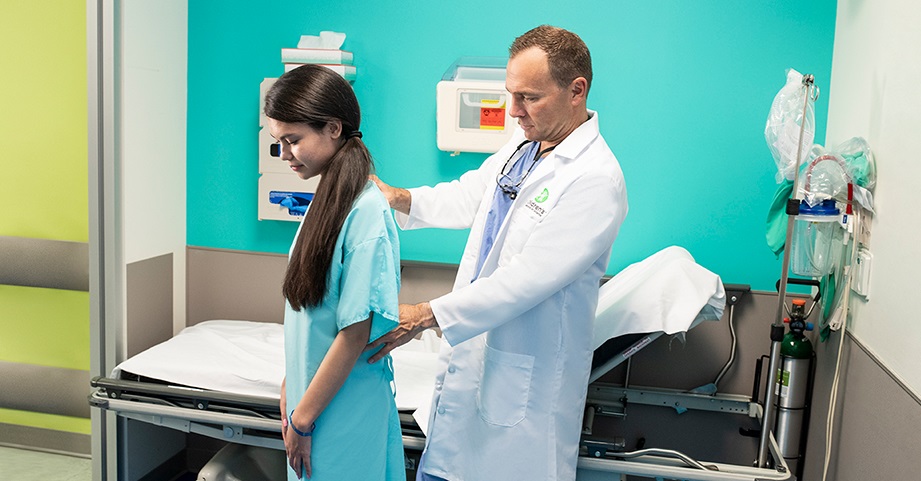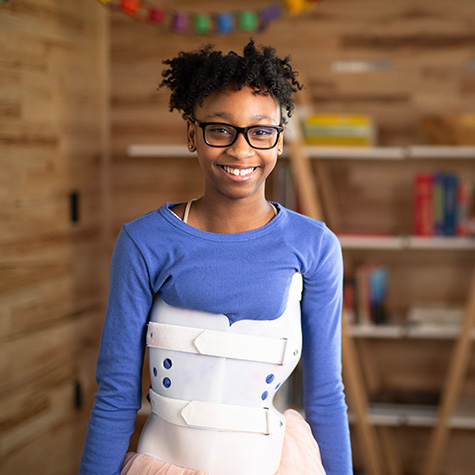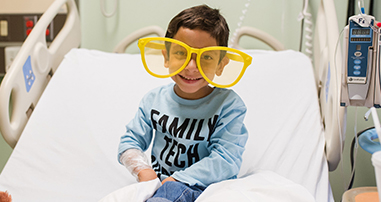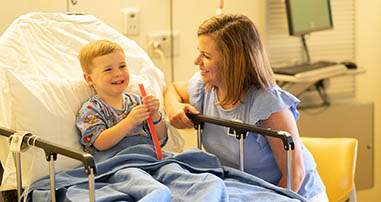Preparing Your Child for Spine Surgery
The idea of your child—regardless of their age—having spine surgery can be a little scary. That is why you can take comfort in knowing your child’s spine is in the hands of a team that performs more spine surgeries than any other pediatric hospital in the country.*
At Children’s Healthcare of Atlanta, we provide expertise in diagnosing, treating and caring for children and teens with spine issues. Our surgeons are pediatric trained, working with kids from birth to age 18, so they know that parents may have questions when preparing their child to undergo spine surgery.

Before your child’s surgery, you should be prepared for a few key things:
- Patient safety while in the hospital
- Infection prevention and hygiene
- Talking to your child about her surgery
- Pre-operative preparation and nutrition
- When your child can go home and the after-surgery plan for recovery
- How to manage discomfort
- Rehabilitation needs
Your Spine Surgery Handbook
During your child’s pre-operative appointment before their procedure, you will receive a Spine Surgery Handbook (en Español) to help guide your family through this process—from start to finish. We recommend you read this handbook and ask your care team any questions you may have.
It’s only natural to have questions in the time leading up to your child’s spine surgery. These are some of the most common questions the pediatric spine specialists at Children’s receive from parents as families prepare for surgery.
Our pediatric spine specialists are dedicated to providing the best care possible and answering any questions parents may have before their child undergoes spine surgery. So if you have any concerns before—or even during or after—your child’s procedure, don’t hesitate to ask.
Our dedicated spine program manager helps coordinate a patient’s experience by providing complete follow-up care and helping make sure families have the information and resources they need before, during and after surgery. The spine program manager also serves as a single point of contact for your child and their primary care provider. Contact the spine program manager at 404-785-7575.
Your child may need blood work to check their blood type. This would take place at your child’s pre-op visit. Your child's surgeon may also request a CT scan or MRI scan in radiology before surgery. Talk with your child’s surgeon for more details and how to schedule.
Most often, your child will have a pre-op visit within 2 weeks of surgery. This includes any labs, imaging, or tests your child needs. During this visit, you will receive a spine surgery handbook to help guide your family through the process.
Your child’s surgeon may ask your child to take a stool softener 3 days before surgery. This will help prevent constipation after surgery. Talk with your child’s anesthesia team to find out what medicines (if any) your child should take the morning of surgery.
Your child should not eat any solid food after midnight the night before surgery. Talk with a member of your child’s care team about when your child should stop drinking.
Yes, you may visit the hospital before your child’s surgery. Children ages 3 and older may visit with you.
- Our child life specialists offer tours that can help your child learn about the hospital and get familiar with the sights, sounds and events they might experience on the day of surgery.
- You and your child will have a chance to ask questions.
To set up a tour, please call:
- Children’s at Egleston Hospital: 404-785-6325.
- Children’s at Scottish Rite Hospital: 404-785-4286.
Most often, your child’s surgery will last 2 to 6 hours depending on the size and complexity of your child’s curve.
Your child’s rods and screws are made out of titanium and cobalt chrome alloy. Research shows these metals are safe to use in your child’s body.
Depending on the type of spine surgery your child has, they may be hospitalized from two to five days. The average length of stay for spine surgery patients at Children’s is three days, which is shorter than most other pediatric hospitals in the country.*
Most often, your child will gain a little bit of height after surgery. The amount depends on the size of your child’s curve and how much the surgery can correct and straighten the curve. When the spine is fused, spinal growth will only stop in the part of the spine that had surgery.
Your child’s doctor may recommend your child see a physical therapist. Before you go home from the hospital, talk with your child’s surgeon to see if your child needs PT.
Typically, the first post-op visit is between 3 to 6 weeks after surgery. Then, you’ll visit with your surgeon 3 months, 6 months, and 1 year after surgery.
It’s normal for your child to have pain and discomfort following their surgery; however, if you are concerned, we encourage you to call your child’s doctor after surgery if your child has:
- A temperature of 101°F
- Increased redness, swelling, tenderness, pain or warmth around the incision site
- Drainage, pain or a bad smell coming from the incision site
- Open areas along the incision line
- Pain that does not get better with pain medicine
- Numbness or tingling in the arms, legs or feet
- Changes in bowel or bladder control
- Vomiting
- Keep the bandage on for 7 days after surgery. You may remove the bandage at home after day 7. Do not put on a new bandage if the wound is clean and dry.
- Keep the bandage clean and dry. The edges should not peel up. Please call the surgeon’s office if the bandage gets dirty or wet or the edges start to peel up. If your child’s surgeon tells you to remove the bandage:
- You may replace it with clean gauze.
- Use 1-inch medical tape to keep the gauze in place.
- Then, remove the gauze after day 7 from surgery.
- After you remove the bandage after day 7, do not put anything on the wound. Do not use any bandages, gauze, lotions, oils or ointments.
- Keep the wound clean and dry. Call your child’s surgeon right away if there is any drainage from the wound.
- Your child may shower the front of their body and legs as soon as they get home. It is important to keep your child’s back dry for 7 days after the surgery.
- It is important to keep your child’s back dry as much as you can—even though the bandage is water resistant.
- Call the surgeon’s office if there is any drainage from the wound.
- Your child may not take a bath, swim or go under water for at least 3 weeks after surgery (The wound must not be submerged or covered in water). The wound must be completely healed before your child may do these things.
Your child may take ibuprofen for pain after surgery. Please follow all dosing instructions for over-the-counter pain medicine.
Most often, your child will start to take a stool softener 3 days before surgery. Your child should continue taking stool softener until they go to the bathroom (pass stool) on a regular basis, and they stop taking prescription pain medicine (opioids).
Most often, your child will not need to wear a spine brace after surgery.
Yes, but not forever. While in the hospital, your child’s care team will help your child roll over in their bed, sit up, stand and even walk. In the few weeks following surgery, the doctor will recommend your child avoid bending, lifting and twisting at first, but as they begin to feel better, you may be surprised by how many normal activities your child can resume.
Your doctor will share a list of specific do’s and don’ts about when it will be safe for your child to resume driving, attend physical education classes and participate in certain sports; how much weight they can lift; and whether they can swim in lakes, oceans or rivers.
Most often, children can return to school 3 weeks after surgery.
- Your child’s care team can help complete homebound forms. Fax or email the forms to the surgeon’s office. You can get these forms from your child’s counselor or teacher.
- Tell the school about your child’s absence and surgery. Be sure to do this before surgery so that the school can excuse your child’s absence. Ask your child’s surgeon for a return to school note at your child’s 3-week post-op visit.
- You may want your child to have a gradual return to school. Start with half days, and work your way up to full days.
- Some students find these tips helpful:
- Keep an extra set of books at home.
- Have a backpack buddy to help carry your child’s backpack.
- Use a rolling book bag.
- Get an elevator pass.
- Use a top locker.
- Ask your child’s school to let your child leave class a few minutes early to get to the next class.
Most often, your child should wait at least 3 months after surgery before returning to doing physical education (PE) at school. Talk with your child’s school to see if they can swap semesters for PE class.
Talk with your child’s surgeon about when your child can return to activities and sports. Most often, your child may do:
- Light exercise at 6 weeks.
- Non-contact sports at 3 months.
- Contact sports at 6 months.
Most often, your child may drive after their first post-op visit. This is about 3 to 6 weeks after surgery and is based on your child’s recovery.
- Your child should not take any prescription pain medicine (opioids) or muscle relaxers after they start driving again.
- Your child should feel comfortable moving and turning their head.
- Talk to your child’s surgeon if you have any concerns.
Our expectation would be that your child will only need one surgery. A few children will need multiple planned surgeries.
Preparing for Spine Surgery
-
Spine Fusion Surgery for Scoliosis
For kids and teens with scoliosis who have finished growing or are almost finished growing, spine fusion surgery can keep their spinal curve from worsening for the rest of their lives.

When it comes to your child’s spine surgery, experience and outcomes matter.
Children’s performs more spinal fusion surgeries than any other hospital dedicated to treating kids and teens, with some of the best spine surgery results in the nation. We are passionately dedicated to making sure your child has the best possible outcomes.
LEARN MORE
What Is Growing Rod Surgery? What to Expect from Your Child’s Procedure
In younger patients who still have more growing to do but need a spine surgery to prevent their scoliosis from worsening, growing rod surgery is a growth-friendly option. Watch this animation to learn what happens during growing rod surgery.
Watch VideoThis content is general information and is not specific medical advice. Always consult with a doctor or healthcare provider if you have any questions or concerns about the health of a child. In case of an urgent concern or emergency, call 911 or go to the nearest emergency department right away. Some physicians and affiliated healthcare professionals on the Children’s Healthcare of Atlanta team are independent providers and are not our employees.
*Pediatric Health Information System (2019), as prepared by the Children’s Hospital Association. This report compares clinical data annually for more than 52 pediatric hospitals in the U.S.
Contact Us 404-255-1933





